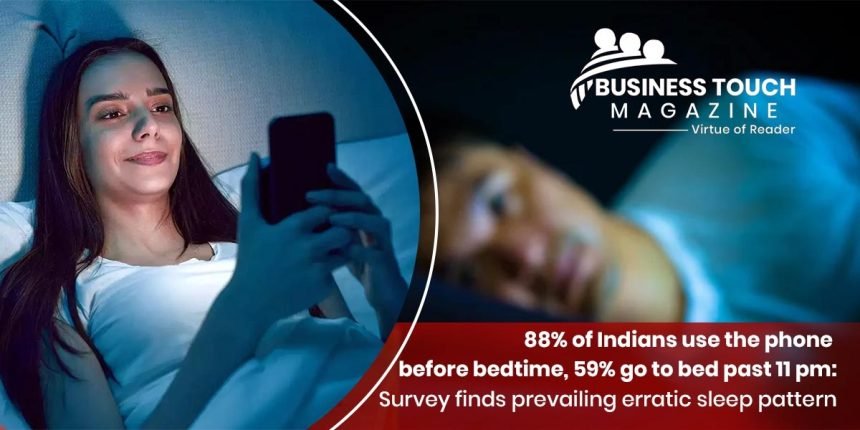The survey found that Indian adults reported that pandemic negatively impacted work routine (43%), sleep routine (41%), ability to sleep well (36%), stress (50%), physical health (35%), and mental/emotional health (47%).
Several reasons underlie the increasing erratic sleep pattern.
First, sleep problems are associated with accidents and human errors. By 2020, the number of people killed in motor-vehicle crashes is expected to double to 2.3 million worldwide, of which approximately 230 000–345 000 will be due to sleepiness or fatigue. Similarly, disturbed sleep has been shown to double the risk of a fatal accident at work over 20 years.
Secondly, sleep deprivation and disorders affect many more people worldwide than previously thought. Insomnia is the most common sleep disorder, with ‘some insomnia problems over the past year’ reported by ∼30% of adults, and chronic insomnia by ∼10%. Prevalence of obstructive sleep apnea, characterized by respiratory difficulties during sleep, is also high with estimates of 9–21% in women and 24–31% in men.
Thirdly, sleep problems are likely to increase. Some data suggest a decline in sleep duration of up to 18 min per night over the past 30 years. Complaints of sleeping problems have increased substantially over the same period, with short sleep (<6 h/night) in full-time workers becoming more prevalent. As more shift work is required to service 24/7 societies, the proportion of workers exposed to circadian rhythm disorders and their effects on health and performance is likely to rise.
Fourthly, there is increasing awareness of the association between sleep problems and health. Longer-term evidence has accumulated of associations between sleep deprivation and sleep disorders and numerous health outcomes including premature mortality, cardiovascular disease, hypertension, inflammation, obesity, diabetes and impaired glucose tolerance, and psychiatric disorders, such as anxiety and depression.
Most sleep disorders can be characterized by one or more of the following four signs:
- You have trouble falling or remaining asleep
- You find it difficult to stay awake during the day
- There are imbalances in your circadian rhythm that interfere with a healthy sleep schedule
- You are prone to unusual behaviors that disrupt your sleep
Any of these signs could indicate a sleep disorder. We encourage people who experience any of these issues to consult with their doctor.
59% of India goes to bed past the ideal bedtime of 11 pm, and social media browsing is the major factor keeping the late-night owls up, with 36% of respondents blaming digital devices for their sleeplessness. An alarming 88% of people use their phone just before bedtime and while this number has come down from last year (92%), it is still a gigantic indicator of addiction to digital devices.
Technology Is The Biggest Threat To Blissful Sleep
All your laptop-using, touchpad-checking, two-thumb-texting, smart phone-listening grown-ups, and kids beware, those devices subtly change your back, eyes, ears, and brains. Technology has crept into every corner of our lives, from obsessive texting to checking emails more often than a stockbroker eyeballs the Dow.
Youngsters Rank High On Awareness But Low On Sleep Health!
It is a proven fact that people simply sleep better when their bedrooms are optimized for light, noise levels, temperature, and comfort. The report indicated that 50% of 18 to 24-year-olds claimed that their bedroom environment has been affecting their sleep health, while 40% of the same group did not have a dedicated sleep space for themselves. However, the senior citizen group seemed to care the least about dedicated sleep spaces with only 18% of them claiming that their sleep is impacted by their bedroom environment. Despite a dedicated sleeping space, 80% of people below 18 years of age did not feel refreshed after waking up.
Sleep is Essential
What all can be done to achieve good sleep to keep mind and body healthy
1. Sleep in well-ventilated rooms and air out your home regularly
When the concentration of CO2 reaches the limit of 1’000 ppm, several body functions such as thinking, coordination, and sleep become affected. Many devices on the market monitor indoor air quality. These can be used to measure the amount of CO2 in bedrooms, offices, cars, and public spaces (e.g., restaurants). A CO2 level of over 2’000 ppm can lead to headaches, poor concentration, increased heart rate, and nausea.
2. Take note of room temperature, air humidity, and pollution
The conditions for good sleep are met when the body doesn’t have to regulate its temperature, reaching what is called the “thermoneutrality state.” You can achieve this at an environmental temperature of 86–90 o F (30–32 o C).
Sleeping in a warm and highly humid environment increases the frequency of wakefulness episodes while low humidity dries out and inflames the respiratory tract. Ideally, humidity in the bedroom should be between 40–60 %.
Air pollution (mostly associated with traffic) affects sleep by acting upon the central nervous system and the upper airways. This can lead to reduced oxygen levels in the blood, respiratory acidosis, and obstructive sleep apnea.
3. Avoid noise, even if you don’t think it bothers you
Noises above 50 dB will shorten your total sleeping time. Even if you think you have become accustomed to the consonant sounds in your environment, your body still perceives these and reacts accordingly. Low-frequency noises (e.g., road vehicles, aircraft, ventilation, and air-conditioning units) may also affect sleep quality by increasing the time it takes to fall asleep and causing you to feel tired in the morning.
4. Turn off all sources of light
During the night, when the eye detects the slightest source of light (e.g., TV or electric clocks) the production of melatonin is stopped and sleep is affected. Sleeping with a nightlight, staying up late in front of the TV or computer screen, and using your phone have all been shown to interfere with sleep.
5. Prescription or over-the-counter drugs
Drug producers are required to include information about how the medicine might negatively impact your well-being.
Drugs that usually cause sleep problems, including beta-blockers, medicines for high blood pressure, hormones, steroids, some antidepressants and anxiolytics, drugs for asthma, allergies, and ADHD, and medications containing alcohol and caffeine (e.g., most of the over-the-counter medications for coughs and colds).
Early To Bed, Early To Rise
Benjamin Franklin, who postulated that “early to bed and early to rise makes a man healthy, wealthy, and wise” may be true in some measure because it hints at a sleep routine with a fixed bedtime and waking uptime, and that itself is the first step to sleep care as it takes care of one’s sleep health. Sleep care steps every individual must take to ensure healthy sleep. Maintaining similar bedtime and wake time is one of the essential steps towards it. Sleep health concerns with all aspects of sleep like sleep quantity and quality whether an individual is getting enough sleep, to determine the pattern and take measures to fix the irregularities if there are aberrations.




